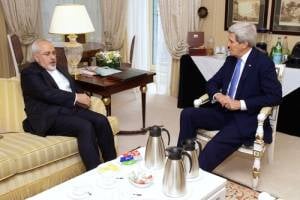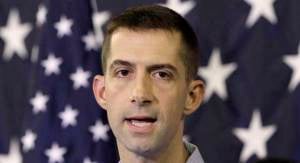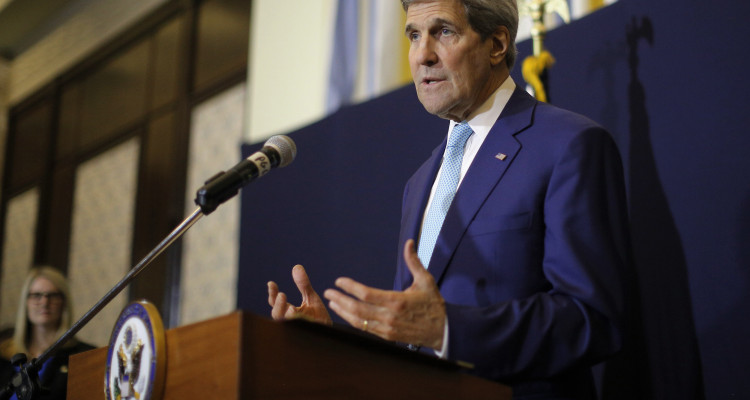Kerry continues to insist that only a negotiated agreement could provide long-term assurance that Tehran would not develop nuclear weapons. Can Iran be trusted?
By: AP

Secretary of State Kerry meets with Iranian FM Zarif for nuclear negotiations. (US Department of State)
US Secretary of State John Kerry delivered on Saturday a highly cautious assessment ahead of the next round of nuclear talks with Iran, citing “important gaps” in the way of a deal before an end-of March deadline.
At a news conference in Egypt, where he attended an economic forum, he said that only a negotiated agreement could provide long-term assurances that Tehran will not develop nuclear weapons. But with a deadline just two weeks away, he did not say whether the United States and other world powers could reach a framework accord with the Iranians or whether they were even close.
“We have made some progress but there are still gaps, important gaps, and important choices that need to be made by Iran in order to move forward,” Kerry told reporters in the Red Sea resort of Sharm el-Sheikh. “The purpose of these negotiations is not just to get any deal,” he said. “It is to get the right deal.”
In an interview with CBS News, Kerry suggested that an extension of the talks was unlikely because it would be unproductive.
“We believe very much that there’s not anything that’s going to change in April or May or June that suggests that at that time a decision you can’t make now will be made then,” Kerry said in an interview for “Face the Nation.”
“If it’s peaceful, let’s get it done. And my hope is that in the next days that will be possible,” he added.
Kerry Criticizes Republican Letter to Iran
Speaking at the news conference after a week of U.S. political fighting, Kerry lambasted 47 Senate Republicans who signed an open letter to the Iranian regime suggesting that any deal they reach with the administration could expire as soon as President Barack Obama leaves the Oval Office.

Senator Tom Cotton. (heymiller.com)
Calling such tactics unprecedented, Kerry said they will inevitably raise questions among Iran and America’s allies in the talks.
In his interview with CBS, Kerry said he would not apologize to the Iranians — “not on your life” — for the Senate Republicans’ letter and then criticized freshman Senator Tom Cotton, the Arkansas Republican behind the communiqué.
“I’m not going to apologize for the … unconstitutional, unthought-out action by somebody who’s been in the United States Senate for 60-something days. That’s just inappropriate,” Kerry said. “I will explain very clearly that Congress does not have the right to change an executive agreement. Another president may have a different view about it. But if we do our job correctly, all of these nations — they all have an interest in making sure this is in fact a proven, peaceful program.”
The conflict between the administration and mainly Republicans in Congress has emerged as among the most tense subplots to the diplomatic effort. Because US lawmakers can block the lifting of some penalties against Iran and potentially pass additional trade or financial restrictions, they hold the power to undermine an accord. They are pressing for at least a say in whether any deal the US and its partners reach is acceptable.
Negotiators are talking about freezing Iran’s uranium and plutonium programs for at least a decade in exchange for a gradual easing of economic pressure on the Iranians. Many in Congress say the US should hold out for greater dismantlement of Iran’s nuclear infrastructure. But opponents of a deal have been vague about what types of continued nuclear activity — if any — they would deem acceptable.
“What’s the alternative?” Kerry asked. “In previous years when US policy was not to talk to Iran and insist at the same time that they can have no nuclear program, whatsoever, the number of centrifuges skyrocketed. Every time negotiations have broken down in the past, Iran’s nuclear program has advanced.”
Kerry, who was schedule to travel Sunday to Lausanne, Switzerland, for several days of discussions with Iranian Foreign Minister Mohammad Javad Zarif, noted the Islamic Republic’s longstanding claims that it has no interest in assembling a nuclear arsenal. Its leaders have issued a fatwa, or formal religious ruling, against such weapons.
The United States, he said, has “great respect for the religious importance of a fatwa.” But negotiators need an agreement that translates that commitment into an agreement that can “guarantee that Iran’s program will be peaceful now and peaceful forever.”
“We still don’t know whether or not we will get there,” Kerry said. “It may be that Iran simply can’t say yes to the type of deal that the international community is looking for, but owe it to the future of everybody in the world to try to find out.”





